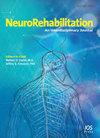求助PDF
{"title":"吞咽治疗对脑卒中伴吞咽困难患者口腔肌肉质量、舌功能、吞咽和营养的影响。","authors":"Guan-Yi Li, Yu-Chi Huang, Jia-Ying Wu, Chau-Peng Leong, Chung-Hui Cheng","doi":"10.1177/10538135241308773","DOIUrl":null,"url":null,"abstract":"<p><p>BackgroundDysphagia, common post-stroke, elevates clinical risks. Muscle atrophy and compromised function correlate with malnutrition and secondary sarcopenia.ObjectiveWe studied oral muscle thickness, tongue strength/endurance in post-stroke dysphagia (PSD) using sonography and Iowa Oral Performance Instrument (IOPI), and assessed swallowing therapy's impact.Methods17 healthy and 15 PSD participants were analyzed. Healthy subjects underwent baseline sonography and IOPI. PSD patients received a 3-week swallowing therapy including traditional methods, neuromuscular electrical stimulation, and IOPI-guided oral exercises. Pre/post-swallowing therapy sonography and swallowing-related evaluations were conducted.ResutlsPSD group exhibited significant differences in affected masseter muscle thickness (P = 0.001), tongue strength (P ≤ 0.001), but not posterior tongue endurance (P = 0.066). After swallowing therapy, PSD patients showed notable improvement in masseter muscle thickness (P = 0.011) and tongue strength (P = 0.005-0.009). Clinical metrics like Functional Oral Intake Scale (P = 0.004), Mini Nutritional Assessment (P = 0.007), and gait speed (P = 0.018) also improved.ConclusionsStroke-induced dysphagia correlates with reduced masseter muscle thickness, tongue strength, and endurance. Swallowing therapy enhanced masseter muscle thickness and tongue strength, potentially improving swallowing function, nutrition, and gait speed.</p>","PeriodicalId":19717,"journal":{"name":"NeuroRehabilitation","volume":"56 2","pages":"164-174"},"PeriodicalIF":1.8000,"publicationDate":"2025-03-01","publicationTypes":"Journal Article","fieldsOfStudy":null,"isOpenAccess":false,"openAccessPdf":"","citationCount":"0","resultStr":"{\"title\":\"Swallowing Therapy Effects on Oral Muscle Mass, Tongue Function, Swallowing, and Nutrition in Stroke Patients with Dysphagia.\",\"authors\":\"Guan-Yi Li, Yu-Chi Huang, Jia-Ying Wu, Chau-Peng Leong, Chung-Hui Cheng\",\"doi\":\"10.1177/10538135241308773\",\"DOIUrl\":null,\"url\":null,\"abstract\":\"<p><p>BackgroundDysphagia, common post-stroke, elevates clinical risks. Muscle atrophy and compromised function correlate with malnutrition and secondary sarcopenia.ObjectiveWe studied oral muscle thickness, tongue strength/endurance in post-stroke dysphagia (PSD) using sonography and Iowa Oral Performance Instrument (IOPI), and assessed swallowing therapy's impact.Methods17 healthy and 15 PSD participants were analyzed. Healthy subjects underwent baseline sonography and IOPI. PSD patients received a 3-week swallowing therapy including traditional methods, neuromuscular electrical stimulation, and IOPI-guided oral exercises. Pre/post-swallowing therapy sonography and swallowing-related evaluations were conducted.ResutlsPSD group exhibited significant differences in affected masseter muscle thickness (P = 0.001), tongue strength (P ≤ 0.001), but not posterior tongue endurance (P = 0.066). After swallowing therapy, PSD patients showed notable improvement in masseter muscle thickness (P = 0.011) and tongue strength (P = 0.005-0.009). Clinical metrics like Functional Oral Intake Scale (P = 0.004), Mini Nutritional Assessment (P = 0.007), and gait speed (P = 0.018) also improved.ConclusionsStroke-induced dysphagia correlates with reduced masseter muscle thickness, tongue strength, and endurance. Swallowing therapy enhanced masseter muscle thickness and tongue strength, potentially improving swallowing function, nutrition, and gait speed.</p>\",\"PeriodicalId\":19717,\"journal\":{\"name\":\"NeuroRehabilitation\",\"volume\":\"56 2\",\"pages\":\"164-174\"},\"PeriodicalIF\":1.8000,\"publicationDate\":\"2025-03-01\",\"publicationTypes\":\"Journal Article\",\"fieldsOfStudy\":null,\"isOpenAccess\":false,\"openAccessPdf\":\"\",\"citationCount\":\"0\",\"resultStr\":null,\"platform\":\"Semanticscholar\",\"paperid\":null,\"PeriodicalName\":\"NeuroRehabilitation\",\"FirstCategoryId\":\"3\",\"ListUrlMain\":\"https://doi.org/10.1177/10538135241308773\",\"RegionNum\":4,\"RegionCategory\":\"医学\",\"ArticlePicture\":[],\"TitleCN\":null,\"AbstractTextCN\":null,\"PMCID\":null,\"EPubDate\":\"2025/2/9 0:00:00\",\"PubModel\":\"Epub\",\"JCR\":\"Q3\",\"JCRName\":\"CLINICAL NEUROLOGY\",\"Score\":null,\"Total\":0}","platform":"Semanticscholar","paperid":null,"PeriodicalName":"NeuroRehabilitation","FirstCategoryId":"3","ListUrlMain":"https://doi.org/10.1177/10538135241308773","RegionNum":4,"RegionCategory":"医学","ArticlePicture":[],"TitleCN":null,"AbstractTextCN":null,"PMCID":null,"EPubDate":"2025/2/9 0:00:00","PubModel":"Epub","JCR":"Q3","JCRName":"CLINICAL NEUROLOGY","Score":null,"Total":0}
引用次数: 0
引用
批量引用

 求助内容:
求助内容: 应助结果提醒方式:
应助结果提醒方式:


